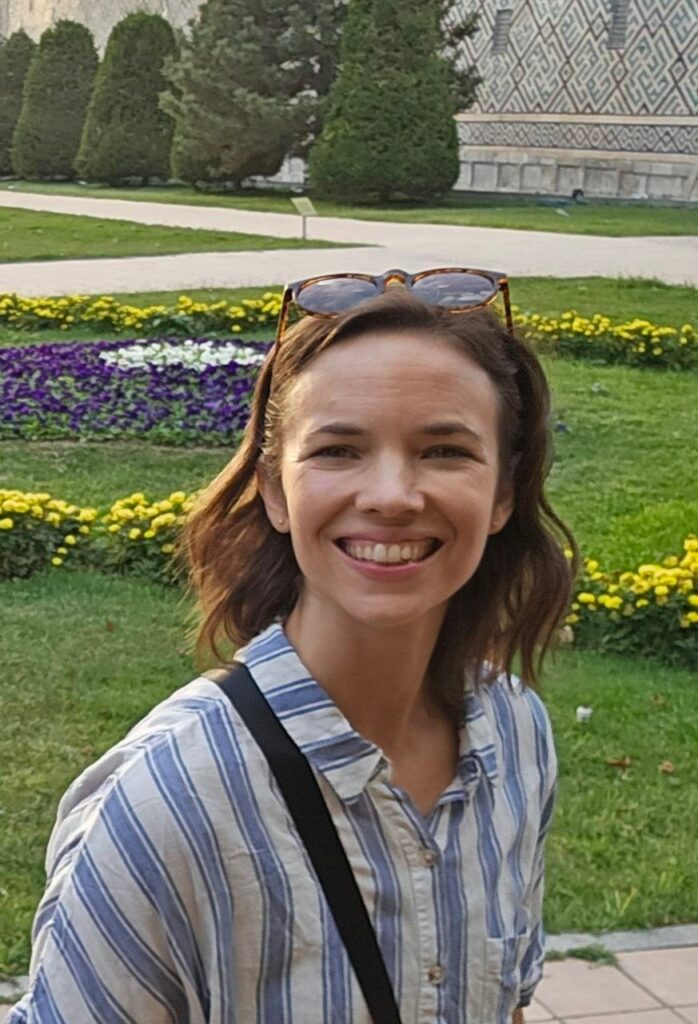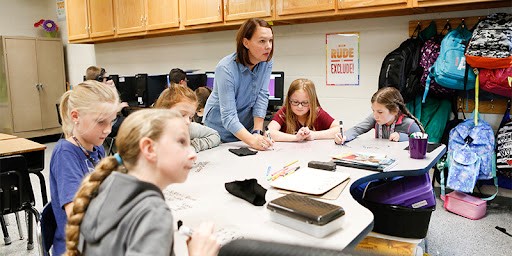CULTURAL EXCHANHE AND PERSONAL GROWTH THROUGH EDUCATION
November 6, 2024We have the pleasure of interviewing Brooke Jeffrey, a committed teacher and cultural enthusiast who traveled the thrilling journey from California to Uzbekistan.
At 34, this driven individual is an advocate for community education in addition to being a loving family man who is married and has three kids. Having previously worked as university counselors, they have seized the chance to become fully immersed in Uzbek culture while studying the language and getting ready to teach English in Tashkent. As they move through this new phase of their lives, let us explore their experiences, perspectives, and goals.


Thank you for joining us today, Brooke. Could you tell me about yourself?
-Yes, 34 years old, I am married, and the proud mother of three amazing kids. My family has been supportive of my journey and means the world to me. I am originally from the US, and I attended a state university in California to study community education. My understanding of the importance of education in fostering community and personal growth has grown because of this field. Since I want to teach English in Tashkent, I recently made the decision to take on a new challenge by learning Uzbek. I am thrilled about the chance to share my English language skills and fully immerse myself in a new culture!

What led you to Uzbekistan, and how did you choose to become a teacher here?

– In California, I work as a counselor for university students. I had an opportunity to visit Central Asia with some American students and loved the culture of Uzbekistan! This trip opened my eyes: the Uzbek people’s rich history, lively culture, and friendly hospitality enthralled me. I could not get rid of the desire to see more of what I had witnessed after I got home. I decided to stay back for a longer amount of time this year. In addition to expanding my knowledge of Uzbek language and culture, I also want to share my English teaching abilities. I am excited to help in this way because I think education is a great way to bridge cultural divides.
What differences have you noticed between the education system in Uzbekistan and your country?
– The American educational systems and Uzbekistan differ greatly in terms of methodology and organization. Teachers in America usually create comprehensive lesson plans that serve as a roadmap for their classes, emphasizing the development of critical thinking skills and the encouragement of self-directed learning. Pupils are frequently urged to actively participate in discussions and challenge information. The educational system in Uzbekistan, on the other hand, seems to be more teacher-centered and heavily dependent on textbooks, in my experience. Students frequently take notes while teachers present material from these books, which they subsequently review for tests. Although each approach has advantages, I value how the American strategy places a strong emphasis on student autonomy and critical analysis. I believe that the commitment to education in Uzbekistan is equally strong, and I’m looking forward to learning more about how these different systems can complement each other.



Have you faced any cultural or language challenges while teaching, and how did you overcome them?
– Absolutely! Since Uzbek is a new language to me, learning it has been one of the most difficult things I have had to do. Sometimes the vocabulary, pronunciation, and structure can be very intimidating. I have approached this challenge with zeal and resolve. I have begun my language studies with an immersive approach, speaking as much as I can to help me communicate with locals and potential students. Additionally, I have tried to get in touch with locals who can help me get better at the language. I have discovered that I can pick things up faster and develop a deeper understanding of the culture by interacting with native speakers, which will eventually benefit my teaching.
How would you describe your teaching style, and how do you adapt it to suit Uzbek students?
– I would characterize my teaching style as a balance between instructor-led and student-centered approaches, even though I have not started teaching yet and am still learning Uzbek. In my opinion, engaging students in the learning process is just as important to effective teaching as imparting knowledge. My objective is to establish an engaging atmosphere where students can freely express their ideas. Over the course of the upcoming year, I intend to modify my teaching strategies to better-fit Uzbek students by learning about their cultural background and preferred methods of learning. I am excited to find out how to integrate regional teaching methods with fresh approaches that encourage students to think critically and work together.
What aspects of Uzbek culture or traditions have you found most interesting or impactful?
– The great sense of hospitality in Uzbek culture is among its most exquisite features. The locals are very hospitable and willing to share their customs and lives with others. It is also remarkable how much emphasis is placed on family and community, which cultivates a loving, caring atmosphere that strengthens bonds. For instance, I have discovered that meals serve as a means of fostering community in addition to providing food. The significance of relationships in Uzbek culture is emphasized by the celebration of weddings, family get-togethers, and other occasions with friends and loved ones. In contrast to the more individualistic mindset, that occasionally defines American culture; I find this strong emphasis on community to be refreshing.
What advice would you give to Uzbek students to help them succeed in their studies and future careers?
– I would advise Uzbek students to look for opportunities to practice speaking with native speakers. Real-world conversations are a great way to learn a language because you can pick up slang terms and build your confidence. Accepting the learning process, which includes making mistakes along the way, is also crucial. Do not be scared to take chances when learning because every error is a step in the right direction. I also advise students to maintain their curiosity and interest in their studies. Education can be more pleasurable and meaningful by helping students make connections between what they learn and their interests, which will ultimately help them, succeed in their future employment.
As our discussion draws to close, it is evident that moving from California to Uzbekistan is not only a professional decision but also a life-changing experience that involves learning, development, and cross-cultural interaction. Our interviewee’s dedication to learning Uzbekistan’s language and rich traditions positions them to both improve their own international experience and have a significant influence on their students’ lives. Their focus on resilience, hospitality, and community serves as a motivational reminder that education crosses boundaries and creates lifelong relationships. In Tashkent, we are excited to watch how their journey develops!
Dilnoza Kodirova
4th Year Student, International Journalism Faculty
Uzbekistan State World Languages University, UZSWLU


No Comments so far
Jump into a conversationNo Comments Yet!
You can be the one to start a conversation.